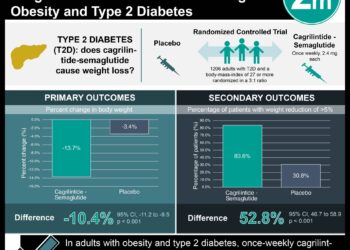Longer lactation duration linked to lower risk of diabetes in women
1. In this 30-year prospective cohort study, self-reported duration of lactation in women of childbearing age was associated with a lower risk of development of diabetes.
2. The association between lactation and lower diabetes risk remained consistent after accounting for important cofactors including gestational diabetes, baseline metabolic profile, and race.
Evidence Rating Level: 2 (Good)
Study Rundown: Observational studies of older women have reported an association between self-reported duration of lactation and risk of diabetes. These investigations are subject to significant sources of bias through their reliance on self-reported disease status and recall of important variables many years after childbearing/lactation periods. The current study sought to evaluate the relationship between lactation and diabetes risk from a prospective, long-term cohort study with data on important baseline metabolic risk factors and biochemical confirmation of diabetes diagnosis. In analysis of the 30-year cohort study, longer lactation duration was linked to lower incidence of diabetes. This association was not affected by gestational diabetes, or race.
The study confirms the previously reported link between length of lactation and risk of subsequent diabetes and provides evidence in support of programs to maximize time of lactation for mothers to help improve long-term health outcomes. The effect was independent of race and social factors, providing evidence of a biologic mechanism for the reduction in DM risk. The major strengths of the study include the baseline risk data, the biochemical diagnosis of diabetes, and the reported lactation duration at regular intervals over a 30-year study period. The major limitations include the cohort design with possible unaccounted for variables, the 30% loss-to-follow-up over the study period, and lack of lactation data on 9.3% of patients.
Click to read the study in JAMA Internal Medicine
In-Depth [prospective cohort]: This study used data from the multicenter Coronary Artery Risk Development Study in Young Adults (CARDIA) 30-year prospective cohort study. Participants were excluded if they were male, had diabetes/pregnancy/lactation at baseline, did not give birth during the study period, or had missing lactation data. Lactation duration and pregnancies were self-reported at five year intervals. Diabetes was diagnosed based on impaired glucose tolerance testing, elevated fasting glucose, or elevated glycated hemoglobin levels measured at regular intervals during the study period.
For the study population the incidence of diabetes was 6.6 cases per 1000 person-years (95%CI, 5.6-7.6). The incidence was increased for these with a history of gestation diabetes (18.0 [95%CI, 13.3-22.8]). Compared to those with no reported lactation, there was reduced adjusted risk hazards for diabetes for those who lactated 0 to 6 months (0.75 [95%CI, 0.51-1.09]); 6-12 months (0.52 [95%CI, 0.31-0.87]), and more than 12 months (0.53 [0.29-0.98]).
Image: CC/Wiki
©2018 2 Minute Medicine, Inc. All rights reserved. No works may be reproduced without expressed written consent from 2 Minute Medicine, Inc. Inquire about licensing here. No article should be construed as medical advice and is not intended as such by the authors or by 2 Minute Medicine, Inc.







